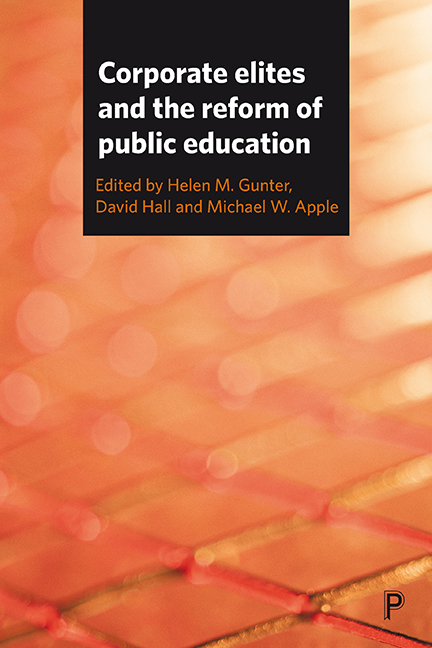Book contents
- Frontmatter
- Contents
- Foreword
- Notes on contributors
- Introduction: Scoping corporate elites and public education
- Part 1 Corporatised governance: system perspectives
- Part 2 Corporatised governance: provision perspectives
- Conclusion: The challenge of corporate elites and public education
- References
- Index
Foreword
Published online by Cambridge University Press: 05 April 2022
- Frontmatter
- Contents
- Foreword
- Notes on contributors
- Introduction: Scoping corporate elites and public education
- Part 1 Corporatised governance: system perspectives
- Part 2 Corporatised governance: provision perspectives
- Conclusion: The challenge of corporate elites and public education
- References
- Index
Summary
Education and elite reproduction are central themes in the sociological tradition. From Pareto's (1991) famous theory on the circulation of elites to Pierre Bourdieu's (1998) critique of the Nobility State, sociologists have evidenced the power and domination relationships as well as the structuration of social classes behind the meritocratic justification of school selection. Sociologists of education have taken a more recent interest in these themes, and this area of research has been considerably updated due the emergence of a globalised cosmopolitan class which challenges the usual standards of social reproduction by the education system. The rise of global mobility, combined with the development of ‘world-class’ schools transform issues of school competition, and create new inequalities between working-class and upper-class students. This edited volume by Helen Gunter, David Hall and Michael Apple offers an eye-opening investigative approach to this new field of research that demonstrates the global reach of the corporate elite through the marketisation/privatisation of education and the influence of business and philanthropy networks in the public education sector.
As Stephen Ball and Deborah Youdell wrote (2008), the privatisation of public education reshapes the boundaries between the public and the private in two ways: as ‘endogenous’ privatisation, it imports ideas, techniques and practices from the private into the public education sector to reproduce business models; as ‘exogenous’ privatisation, it opens public education to the private sector in order to make profits and replace some services. Exogenous privatisation is characterised by the externalisation of services in school transportation, catering, digital technologies, textbooks, cleaning services and extracurricular activities. These services are sold to schools, leading to the integration of the market within the public education sector. This can be described as a ‘McDonaldisation’, ‘Coca-Colisation’ or ‘Microsoftisation’ of the educative sphere. Moreover, as they push a common neoliberal agenda on policy makers, business leaders and philanthropists cooperate through global powerful networks to promote school choice, public– private partnerships, the diversification of school provision and statuses, the introduction of digital technologies and other commercial products (Ball, 2012).
The Right's systematic critique of public education laid the groundwork for this neoliberal indoctrination. Michael Apple convincingly showed that the critique of US public schools was supported by a New Right rhetoric that gained legitimacy during the presidential mandates of Reagan and Bush (Apple, 2006).
- Type
- Chapter
- Information
- Corporate Elites and the Reform of Public Education , pp. v - viiiPublisher: Bristol University PressPrint publication year: 2017

